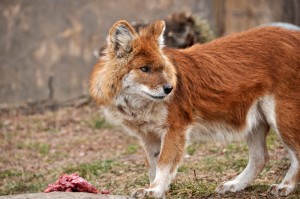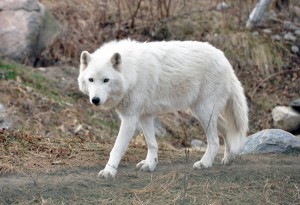
The IUCN Red List of Threatened Species describes the dhole, among other animals, as currently endangered. Estimates show that fewer than 2,500 mature dholes remain in the wild and the declining population trend is expected to continue.
The death of Lonesome George in June 2012 brought global attention to the fragile state of some species. Lonesome George was a Pinta tortoise (Geochelone elephantopus abingdoni) from the Galapagos Islands. Scientists theorized that he was the last of his subspecies. The focus on his story shed light on the reality that conservation efforts can be unsuccessful. National Geographic explains that we are in the midst of the Sixth Great Extinction, the first mass extinction to occur during the existence of humans. Further, it is an extinction characterized as almost exclusively driven by humans; between 17,000 and 100,000 species become extinct each year. In this time of urgency, many are driven to take part in conservation initiatives by a desire to help. Others take part because they feel an obligation to animals. And there are also people who believe protecting other species is a necessity for the sustainability of ecosystems.
Several months ago, I participated in a rather ambiguous debate where we ranked different types of catastrophes caused by humans. We ranked them on a scale from one to ten, based on how terrible we considered each catastrophe. One of the topics that came up was the potential extermination of a species of whale. Some people, including myself, ranked it very high, while others ranked it quite low. One of the recurring themes throughout the debate was the question: What does this species of whale offer to humankind? The general consensus was that the extermination of a whale species would be catastrophic only if the species provides something unique and beneficial to humans.
I became frustrated at the way some people approached and rationalized this subject. In a time when many species are in danger of extinction, I don’t believe conservation efforts should be provided exclusively to animals that provide humans with a particular resource. All living things have an ecological function at stable populations in their natural environments. This way, even though an animal may appear insignificant in the web of life, its disappearance could be disastrous.
My first encounter with the complexities of ecosystems was in elementary school when I borrowed a children’s book from the library, Wolf Island by Celia Godkin. The book describes the changes that occur on an island after a family of wolves moves to the mainland. For the wolves, the primary prey source were the deer and eventually, the absence of the wolves causes the deer on the island to multiply rapidly. The larger deer population consumes so much vegetation that rabbits and mice suffer from a food shortage and subsequent starvation. This causes the rabbit and mouse populations to decrease and results in less food for animals who prey on them, such as foxes and owls. The text explains how the disappearance or decline of a species can affect the food chain and endanger other species. In the end, the wolves return to the island and eventually restore the balance of the ecosystem.
 The elementary example in Wolf Island shows how the natural balance can easily be disrupted, often in unexpected ways. Human actions can inadvertently disturb ecosystems. For example, the once common Indian vulture has suffered a catastrophic decline since the mid-1990s. According to The International Union for Conservation of Nature (IUCN) Red List of Threatened Species, the Indian vulture population has declined by over 97 per cent and the species is classified as critically endangered. Extensive research has determined that the veterinary drug diclofenac is the cause of this decline. The non-steroidal anti-inflammatory drug was used to treat domestic livestock and was ingested by vultures feeding on their carcasses. Vultures who fed on the carcasses of animals treated with diclofenac died from visceral gout caused by renal failure.
The elementary example in Wolf Island shows how the natural balance can easily be disrupted, often in unexpected ways. Human actions can inadvertently disturb ecosystems. For example, the once common Indian vulture has suffered a catastrophic decline since the mid-1990s. According to The International Union for Conservation of Nature (IUCN) Red List of Threatened Species, the Indian vulture population has declined by over 97 per cent and the species is classified as critically endangered. Extensive research has determined that the veterinary drug diclofenac is the cause of this decline. The non-steroidal anti-inflammatory drug was used to treat domestic livestock and was ingested by vultures feeding on their carcasses. Vultures who fed on the carcasses of animals treated with diclofenac died from visceral gout caused by renal failure.
The plummeting vulture population resulted in the availability of more livestock carcasses for rats and feral dogs in India. Consequently, rat and feral dog populations have increased significantly. The booming population of feral dogs has resulted in a rabies epidemic, causing the death of thousands of people in India annually.
There are many other examples of the delicate balance in ecosystems. When one studies them, it’s clear that many species, such as the Indian vulture, are beneficial to humans and we often don’t realize the benefit of the species until they become endangered.
So my verdict on the potential extermination of a whale species is that it would be catastrophic. I believe conservation efforts should be made to protect species from extinction, regardless of whether we believe they provide something unique and beneficial to humans . . . for we might not discover the significance of the species until it is lost.
I hope more people will realize the importance of animal conservation. Whether it’s due to a desire, obligation or necessity in mind, the fight for conservation should not be left behind.
This is a powerful and informative piece on conservation efforts, that underscores the delicate balance of ecosystems. It’s both amazing to learn about the state of nature as well as disheartening to consider the human impact that is becoming all too pervasive.
As you emphasize within the post with the literary example of “Wolf Island”, a disbalance of an ecosystem can occur strictly because of the animal populations present (i.e., invasive species or lack of predators). Alternatively, I believe, a much more dire situation occurs when human’s interfere with the natural state of the environment. For example, when we develop residential properties on what was previously a conservation area or a forest habitat, we are effectively displacing and causing a catastrophe on the species that live there. If some species leave the area, others remain because of the inability to adapt elsewhere and this causes a tipping of the ecological state of the area. Other things that come to mind associated with human impacts are the obvious: illegal logging, building of dam projects which are one of the most serious threats to habitat loss and species decline, pollution of the environment so that the animals that still inhabit the region become sickly and produce unhealthy offspring, and so on.
I think you cover the essential issues regarding animal conservation and do so eloquently with the support of well illustrated examples and literature. In my strong opinion, it is simultaneously our desire, obligation and necessity to focus on conservation. If we continue neglecting these crucial issues, sooner or later we will have to account for them, and this will not be in our best interests.
Living in harmony, or at least, some perceived notions of consideration and respect for all animals is the best way; it will ensure that we act humanely, intelligently, and benefit us directly in the securing of our futures. After all, the ecosystem is such a delicate thing that must be safeguarded for our own livelihoods; our agriculture (food source), the air we breath and the water essential for survival are all implicated in this. I can think of no higher purpose for putting a much stronger step forward for the conservation of animals and the environment that “they”, “we” and “all” of us so depend on.
Thanks for an intellectual and meaningful read. I have been following your posts from the beginning and find them all exceptional and highly relevant to significant issues within society.
Keep up the great work!